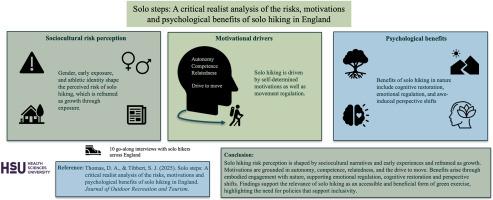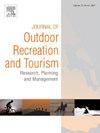单人徒步:对英国单人徒步的风险、动机和心理益处的批判性现实主义分析
IF 4.4
3区 管理学
Q1 HOSPITALITY, LEISURE, SPORT & TOURISM
Journal of Outdoor Recreation and Tourism-Research Planning and Management
Pub Date : 2025-06-13
DOI:10.1016/j.jort.2025.100903
引用次数: 0
摘要
英国有丰富而受欢迎的徒步旅行文化,但独自徒步旅行的独特心理动力仍未得到充分探索。这项研究通过批判现实主义的视角考察了独自徒步旅行者的风险感知、动机和幸福感。对10位徒步旅行者的访谈进行了主题分析。研究结果表明,社会文化因素,包括早期暴露和运动身份,塑造了风险感知,但风险也被重新定义为通过反复的单独徒步旅行暴露获得个人成长的机会。独自徒步旅行的内在动机与自我决定理论一致,包括自主性、能力和相关性,而移动的驱动力是运动调节的一个额外因素。心理上的好处包括认知恢复、情绪自我调节和敬畏引起的观点转变。这些被体现在自然中的多感官沉浸所强化。这些发现有助于对英国单人徒步旅行的心理学理解,强调需要制定社会和文化敏感的政策,以提高安全性、可达性和治疗应用。未来的研究应该探索不同的人群和独自徒步旅行对健康的长期影响。本文章由计算机程序翻译,如有差异,请以英文原文为准。

Solo steps: A critical realist analysis of the risks, motivations, and psychological benefits of solo hiking in England
England has a rich and popular hiking culture, yet the unique psychological dynamics of solo hiking remain underexplored. This study examined solo hikers' risk perceptions, motivations, and well-being through a critical realist lens. Go-along interviews with ten solo hikers across English trails were thematically analysed. Findings suggest that sociocultural factors, including early exposure and athletic identity, shaped risk perception, yet risk was also reframed as an opportunity for personal growth through repeated solo hiking exposure. Intrinsic motivations for solo hiking aligned with self-determination theory, including autonomy, competence, and relatedness, while the drive to move emerged as an additional factor in movement regulation. Psychological benefits included cognitive restoration, emotional self-regulation, and awe-induced shifts in perspective. These were heightened by an embodied multisensory immersion in nature. These findings contribute to the psychological understanding of solo hiking in England, underscoring the need for socially and culturally sensitive policies to enhance safety, accessibility, and therapeutic application. Future research should explore diverse populations and the long-term implications of solo hiking for well-being.
求助全文
通过发布文献求助,成功后即可免费获取论文全文。
去求助
来源期刊

Journal of Outdoor Recreation and Tourism-Research Planning and Management
HOSPITALITY, LEISURE, SPORT & TOURISM-
CiteScore
6.70
自引率
5.30%
发文量
84
期刊介绍:
Journal of Outdoor Recreation and Tourism offers a dedicated outlet for research relevant to social sciences and natural resources. The journal publishes peer reviewed original research on all aspects of outdoor recreation planning and management, covering the entire spectrum of settings from wilderness to urban outdoor recreation opportunities. It also focuses on new products and findings in nature based tourism and park management. JORT is an interdisciplinary and transdisciplinary journal, articles may focus on any aspect of theory, method, or concept of outdoor recreation research, planning or management, and interdisciplinary work is especially welcome, and may be of a theoretical and/or a case study nature. Depending on the topic of investigation, articles may be positioned within one academic discipline, or draw from several disciplines in an integrative manner, with overarching relevance to social sciences and natural resources. JORT is international in scope and attracts scholars from all reaches of the world to facilitate the exchange of ideas. As such, the journal enhances understanding of scientific knowledge, empirical results, and practitioners'' needs. Therefore in JORT each article is accompanied by an executive summary, written by the editors or authors, highlighting the planning and management relevant aspects of the article.
 求助内容:
求助内容: 应助结果提醒方式:
应助结果提醒方式:


